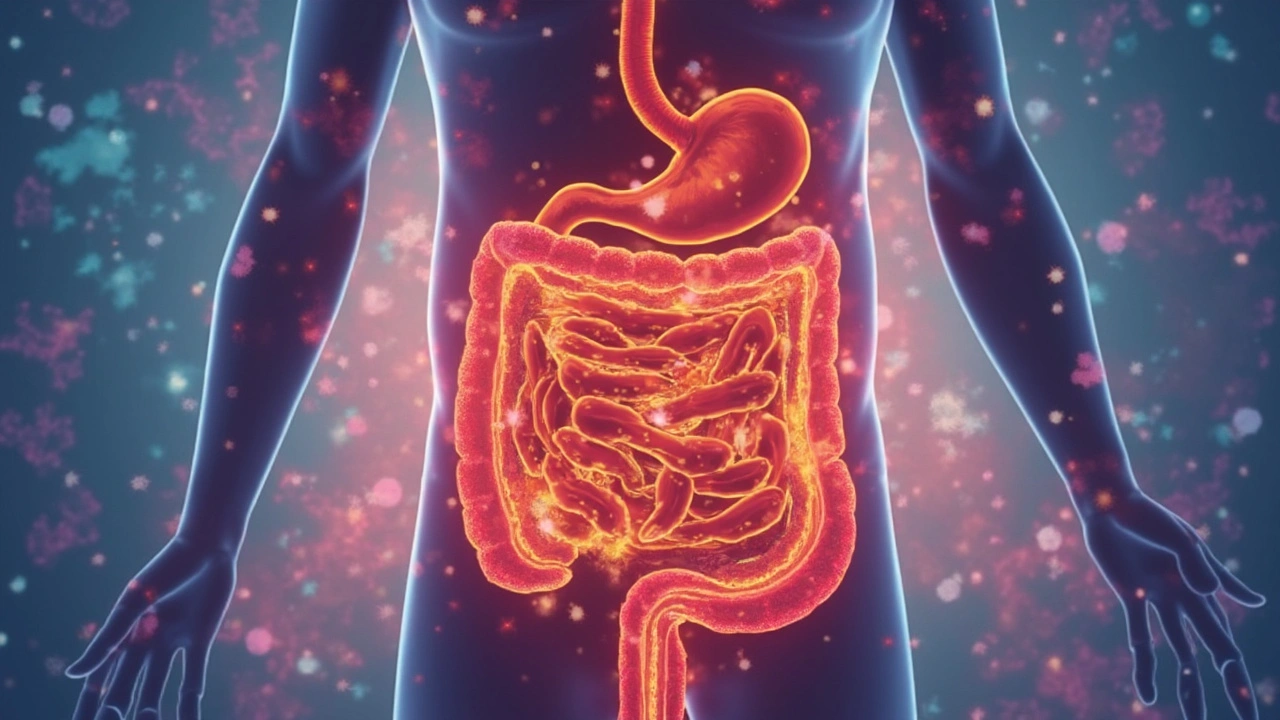Imagine heading out for a hike here in Calgary, but your belly feels so blown-up that every step turns into a chore. Abdominal distension has a way of making you want to hibernate instead of explore. Most folks blame last night’s pizza or maybe stress, but what if your gut bacteria are quietly steering the ship? That’s where probiotics grab the spotlight. You don’t need to be a nutrition nerd to know gut health matters, but the real question is: do probiotics actually help with belly bloat, or are they just another bottle on the supplement shelf?
What’s Really Going On With Abdominal Distension?
Let’s pull back the curtain on this annoyingly common issue. Abdominal distension isn’t just about too-tight pants after a big meal; it’s a sign your digestive system is waving a white flag. Real distension means your abdomen physically expands—your gut is filling with air, fluid, or sometimes both. In Canada, about 15 to 30 percent of adults face this at least once a week according to a survey published by the University of Alberta. That’s millions of us feeling like overinflated pool toys.
Why does this even happen? It’s usually a mix of overeating, eating too fast, food intolerances, gut infections, or even just swallowing air. One big culprit is the way our gut bacteria handle what’s left behind by our guts—especially carbs we can’t fully digest. Certain bacteria feast away, creating gas as a side effect. This is totally normal, but when there’s an imbalance, that gas builds up more than it should. Other times, nerve signals in the gut get mixed up, so you feel distended without much extra air. People with IBS (Irritable Bowel Syndrome), SIBO (Small Intestinal Bacterial Overgrowth), or even anxiety report this a lot more.
Doctors used to shrug and say, “Avoid beans and fizzy drinks,” but today’s research is digging deeper. Your gut is a thriving ecosystem of trillions of bacteria, yeast, and viruses—your very own rainforest right inside you. When this mix is out of whack (what scientists call dysbiosis), abdominal distension gets worse. Recent studies—like one run by McMaster University—found that IBS sufferers have a different kind of gut bug cocktail, leading to more bloating, gas, and those infamous stomach balloon moments.
Check out some of the main triggers and how often they pop up:
| Trigger | How Common? | Example Foods |
|---|---|---|
| Lactose intolerance | About 20% in Canada | Milk, ice cream |
| Fructose sensitivity | Up to 40% of people with bloating | Apples, honey |
| Sorbitol | Common in "sugar-free" foods | Sugar-free gum |
| High FODMAPs | Up to 75% of IBS sufferers | Onions, garlic, wheat |
| Constipation | 1 in 4 adults | - |
If any of that info hits close to home, you’re in good company. So, where do probiotics come into the picture?
How Probiotics Work Their Gut Magic
Everyone loves talking up probiotics as the best thing since sliced bread, but how do these tiny bacteria really help? Picture your gut as a city—bacterial “citizens” keep things running smoothly, building roads, cleaning up trash, and making sure traffic (that’s your food) moves along neatly. Probiotics are the friendly “special forces” you recruit to keep peace in the city.
Probiotics are live bacteria and yeasts, usually the good kind. They show up in foods like yogurt, kefir, sauerkraut, kimchi, and some cheeses—plus in supplement powders and capsules. The main superstars are Lactobacillus and Bifidobacterium species, but there are dozens of strains, and they don’t all do the same thing. Their job? Outcompete the troublemakers, help break down food, and keep your gut lining strong.
Here’s how probiotics tackle abdominal distension specifically:
- Gas Production Control: Certain probiotic strains break down undigested food without turning it into loads of gas, so your gut doesn’t become a balloon.
- Calm Down Gut Inflammation: Some strains reduce inflammation and quiet down nerves that might otherwise make you feel pain and discomfort with even tiny amounts of gas.
- Stronger Gut Barrier: Probiotics help build a firmer “wall” in the gut, so toxins and bad bacteria don’t sneak through and cause chaos.
- Improved Motility: If your gut gets sluggish (constipation!), more friendly bugs can help nudge things along so nothing gets stuck for days.
- Better Immune Balance: These guys train your immune system, so it stops overreacting to every little thing you eat.
That sounds great, but does it actually work? One meta-analysis in 2023 pooled results from 21 clinical trials—18 showed people with frequent bloating noticed real improvement after a few weeks on the right probiotic. Not a miracle, but statistically meaningful. The trick is picking strains that have more proof behind them. Lactobacillus plantarum 299v and Bifidobacterium infantis 35624 are two standouts—used in Europe and Canada for IBS and verified in studies to shrink symptoms. Don’t expect instant fireworks though; most research points to benefits showing up after 3–8 weeks of daily use.

Which Probiotics Work Best for Abdominal Distension?
The shelves at your local pharmacy probably look a bit overwhelming—row after row of colorful probiotic bottles, each claiming to be “the best.” So, which ones actually deliver when you’re battling abdominal distension?
Here’s where real-world evidence kicks in. Different strains help in different ways, so picking a product isn’t just about grabbing the highest CFU (colony-forming units) count. You want a strain that’s been studied for bloating and discomfort, not just “gut health” in general. Let’s break down the stars for bloating:
- Lactobacillus plantarum 299v: Clinical studies from Sweden and Poland show this one knocks down bloating and belly pain by almost 35% in people with abdominal discomfort. Found in some European and Canadian supplements.
- Bifidobacterium infantis 35624: An Irish study put this at the top for relieving overall IBS symptoms, especially bloating and gas. Sold under a few brand names in Canada.
- Lactobacillus rhamnosus GG: Known for balancing out the gut in cases of antibiotic use and mild IBS, with some reports of reduced bloating.
- Multistrain combinations: Some products use a blend of different species—like VSL#3, which contains 8 different bacteria and is used in hospital settings for tough cases of gut imbalance. Small-scale studies show up to 50% less bloating over 6 weeks.
- Saccharomyces boulardii: Not technically a bacteria but a yeast, this one fights back against bad bacteria after antibiotics, lowering gas as the gut recovers.
Beyond pills, don’t ignore the power of food. Real-live fermented foods can pack a punch if you include them regularly. A few spoonfuls of sauerkraut or kimchi, real yogurt (not the candy-colored kind), and unpasteurized pickles can add up over time. Beware though—not everyone tolerates fermented foods, especially if you’re sensitive to FODMAPs or histamines.
There’s a catch: not every probiotic will work for every person. Your unique mix of gut bugs, diet, and lifestyle shape what you’ll respond to. The studies suggest trying one strain at a time for at least a month, tracking your symptoms honestly before switching if needed.
Practical Tips and Mistakes to Avoid When Using Probiotics
Diving into probiotics is tempting, but what you don’t know can waste your money—or leave you just as bloated as before. It’s not about popping a pill and waiting for magic. Here’s how to get the most from probiotics if you’re wrestling with abdominal distension:
- Start with One Strain: Don’t shotgun 12 strains at once. Try a single well-studied strain for 4–6 weeks before switching or adding more.
- Consistency Rules: Probiotics need to “move in” to your gut. Skipping days means they don’t get a chance to settle and do the work.
- Take with Food: Swallowing probiotics along with meals helps them survive stomach acid. Breakfast or lunch is often best.
- Don’t Ignore Symptoms: If you feel worse (more bloating, cramping, weird rashes), it’s not “die-off”—stop right away and check ingredients for inulin or prebiotics you can’t tolerate.
- Store Properly: Some probiotics die off if they get too hot. Keep them in the fridge if the label says so.
- Aim for Real Fermented Foods: Not all yogurt has live cultures, so check labels for “live and active cultures.” Bonus: you’ll also get protein and calcium.
- Stick to a Simple Diet: Don’t overload your gut with beans, spicy foods, and heavy meals while testing probiotics. Simpler meals help track improvements.
Lots of people overlook the “other stuff”—hydration, fiber, and stress. If you’re chronically dehydrated or not getting enough fiber, even the best probiotic won’t fix a sluggish or swollen belly. As your gut adjusts, go easy on sugary processed foods and fatty take-out. A Canadian family doctor might also recommend a low FODMAP eating approach for a month while layering in probiotics for best results.
Common slip-ups usually involve: picking trendy brands without the right strains, dropping probiotics after only a week, or going too hard with every supplement in sight. Sometimes, less is more. Also, don’t expect probiotics to solve everything if you actually have underlying diseases—like celiac or pancreatic issues—where you need more specialized care.
A tip straight from my own routine? A tablespoon of kimchi with lunch works wonders and adds a little heat on cold Calgary days. And yeah, if I forget my morning probiotic for a few days, I can usually tell—old symptoms sneak back in fast.

Common Questions: Clearing the Air on Probiotics and Bloat
People swap a ton of questions about probiotics at local gyms, cafes, and family dinners. Here’s what comes up most, with honest, straight answers to keep it real:
- Do probiotics help everyone? Not always. About 60-70% see an improvement, but a chunk of people don’t notice much—depends on your symptoms, gut bug mix, and why you’re bloated.
- How long until I feel better? Research and real-world stories say it takes 2–8 weeks to really notice less bloating. Anything faster is rare, unless you’re starting after antibiotics.
- Do probiotics make you gassy first? Sometimes, yes. When “new” bacteria start working, you might feel extra rumbling. If it’s mild, wait it out. If it gets worse or painful, the strain might not fit you.
- What about kids or older adults? Kids can use certain strains, but always consult a pediatrician first. For older adults, look for verified strains and start low—our digestion slows with age.
- Can I just eat yogurt for probiotics? It helps, but the bacterial counts and strains in yogurt are usually lower than what studies use. Still, real yogurt is a safe daily addition.
- What if I have serious health issues? Probiotics are usually safe, but people with immune problems, cancer, or who’ve just had major surgery should talk to a doctor before jumping in. Rare, but infections can happen.
Heads up—a little initial bloating isn’t always a bad sign. It can mean the new bugs are waking up and cleaning shop. Adjust your dose or switch up strains if things get too wild, and don’t expect miracles from one capsule. Building a gut-friendly environment is a long game.
Still, for most people struggling with the trapped-gas “air mattress” feeling, the right probiotics offer a pretty solid shot at feeling lighter, more energetic, and ready to enjoy all those mountain hikes without constantly checking where the nearest restroom is. If nothing else, you’ll have a promising, science-backed reason to load up on tasty fermented foods—and maybe start a friendly debate at dinner about which bacteria really rule the gut.








